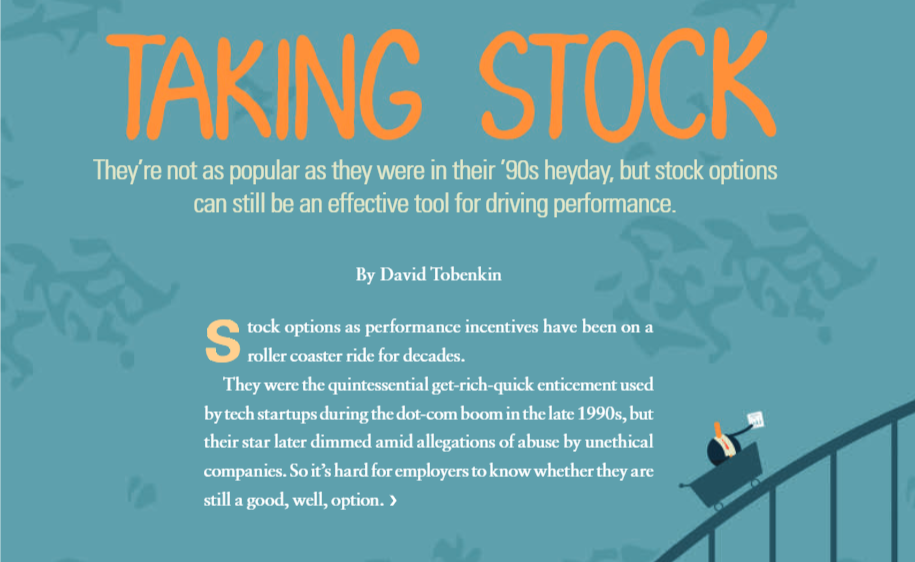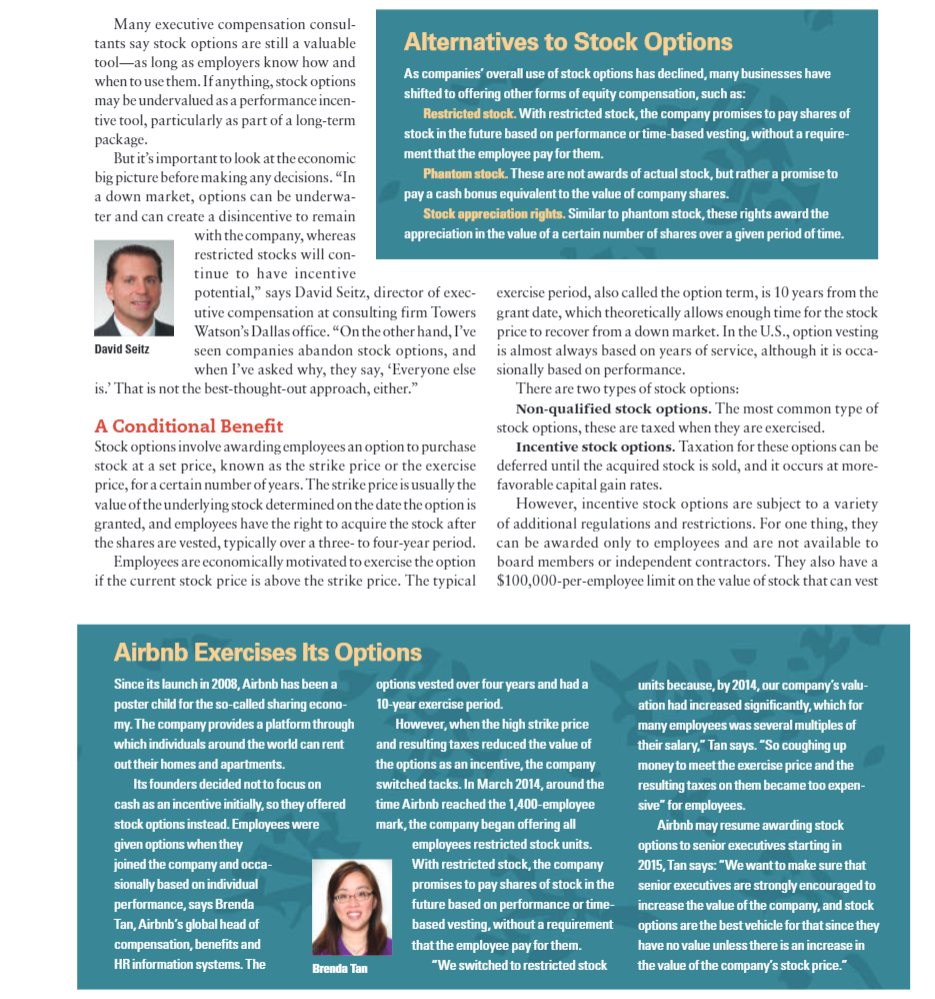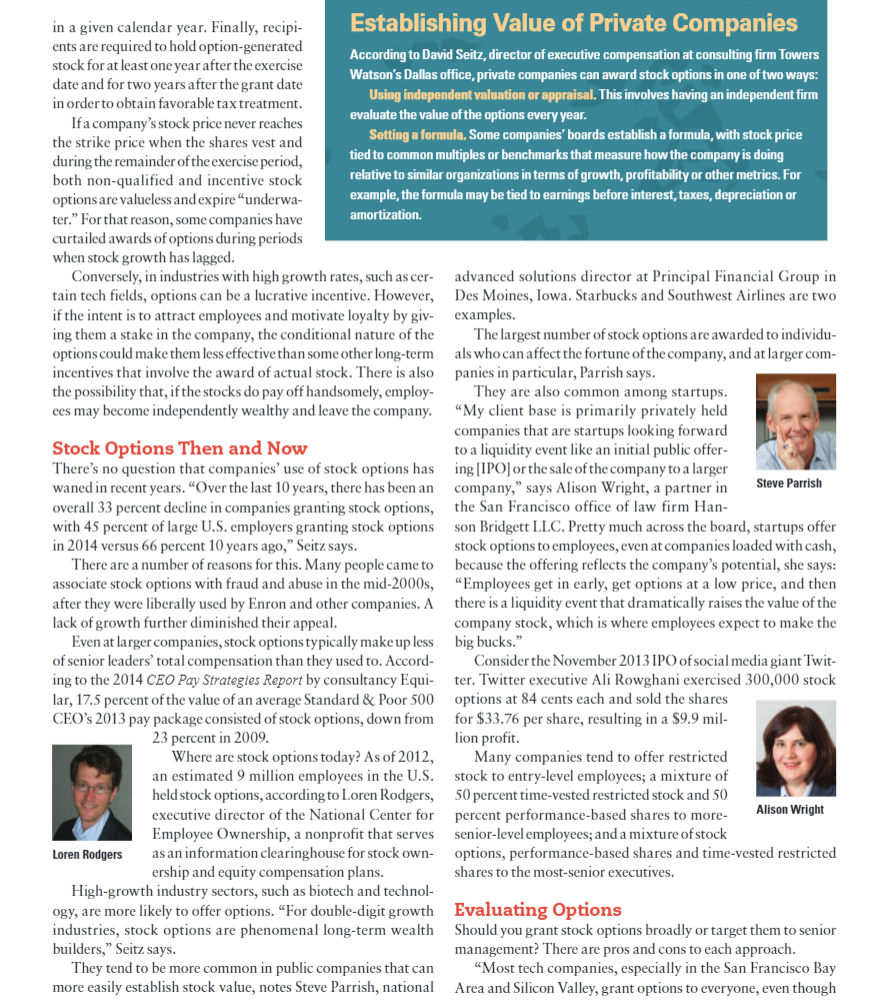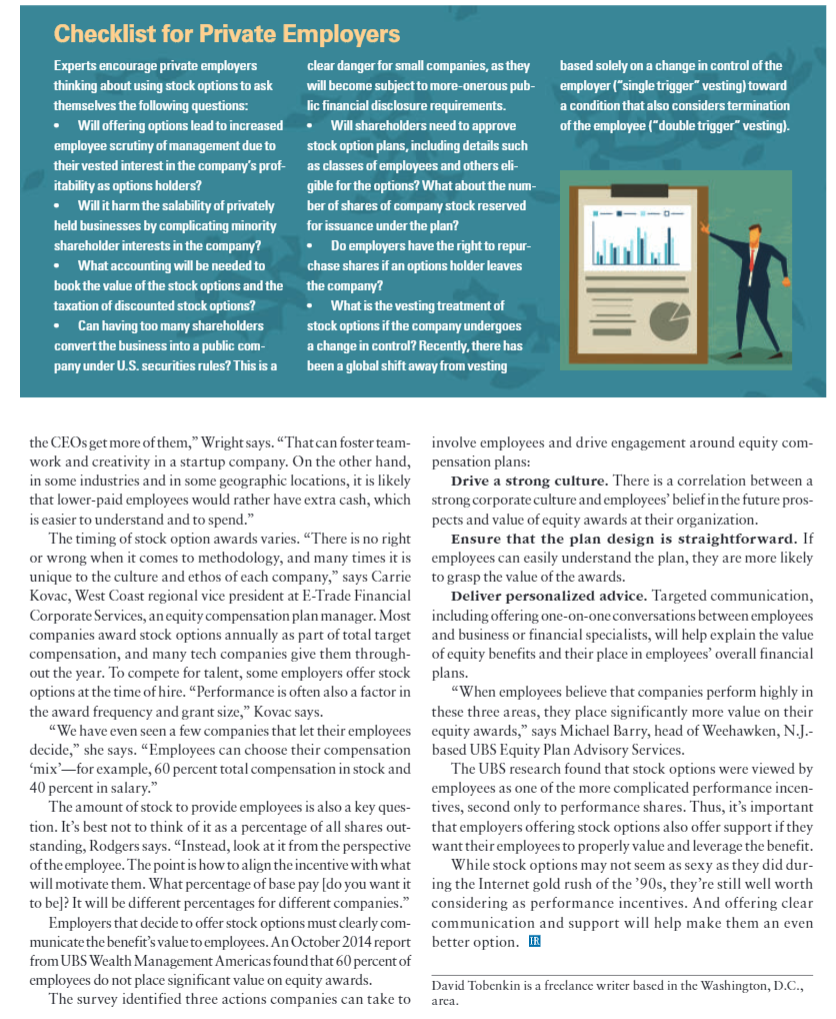Read the article and answer the following questions:
1. What are some alternatives to stock options?
2. Are stock options effective tools to drive employee performance? If yes, why and under what conditions? If not, why?
3. Discuss the trend in the use of stock options. Do more or fewer companies use stock options? Any reasons behind this trend?
4. If you were contacted by a company that is interested in implementing a stock option plan and were asked to give advice on the following questions, how would you respond?
- Should stock options be granted to senior management only?
- When is a good time to grant stock options?
- What would be the appropriate amount of stock to provide employees?




TAKING STOCK They're not as popular as they were in their '90s heyday, but stock options can still be an effective tool for driving performance. By David Tobenkin S colecione or more incentives have been on a tock options as performance incentives have been on a roller coaster ride for decades. They were the quintessential get-rich-quick enticement used by tech startups during the dot-com boom in the late 1990s, but their star later dimmed amid allegations of abuse by unethical companies. So it's hard for employers to know whether they are still a good, well, option. ) Many executive compensation consul- tants say stock options are still a valuable Alternatives to Stock Options toolas long as employers know how and when to use them. If anything, stock options As companies' overall use of stock options has declined, many businesses have may be undervalued as a performance incen- shifted to offering other forms of equity compensation, such as: tive tool, particularly as part of a long-term Restricted stock. With restricted stock, the company promises to pay shares of package. stock in the future based on performance or time-based vesting, without a require- But it's important to look at the economic ment that the employee pay for them. big picture before making any decisions. "In Phantom stock. These are not awards of actual stock, but rather a promise to a down market, options can be underwa- pay a cash bonus equivalent to the value of company shares. ter and can create a disincentive to remain Stock appreciation rights. Similar to phantom stock, these rights award the with the company, whereas appreciation in the value of a certain number of shares over a given period of time. restricted stocks will con- tinue to have incentive potential, says David Seitz, director of exec- exercise period, also called the option term, is 10 years from the utive compensation at consulting firm Towers grant date, which theoretically allows enough time for the stock Watson's Dallas office. "On the other hand, I've price to recover from a down market. In the U.S., option vesting David Seitz seen companies abandon stock options, and is almost always based on years of service, although it is occa- when I've asked why, they say, Everyone else sionally based on performance. is.' That is not the best-thought-out approach, either." There are two types of stock options: Non-qualified stock options. The most common type of A Conditional Benefit stock options, these are taxed when they are exercised. Stock options involve awarding employees an option to purchase Incentive stock options. Taxation for these options can be stock at a set price, known as the strike price or the exercise deferred until the acquired stock is sold, and it occurs at more- price, for a certain number of years. The strike price is usually the favorable capital gain rates. value of the underlying stock determined on the date the option is However, incentive stock options are subject to a variety granted, and employees have the right to acquire the stock after of additional regulations and restrictions. For one thing, they the shares are vested, typically over a three-to four-year period. can be awarded only to employees and are not available to Employees are economically motivated to exercise the option board members or independent contractors. They also have a if the current stock price is above the strike price. The typical $100,000-per-employee limit on the value of stock that can vest Airbnb Exercises Its Options Since its launch in 2008, Airbnb has been a poster child for the so-called sharing econo- my. The company provides a platform through which individuals around the world can rent out their homes and apartments. Its founders decided not to focus on cash as an incentive initially, so they offered stock options instead. Employees were given options when they joined the company and occa- sionally based on individual performance, says Brenda Tan, Airbnb's global head of compensation, benefits and HR information systems. The Brenda Tan options vested over four years and had a 10-year exercise period. However, when the high strike price and resulting taxes reduced the value of the options as an incentive, the company switched tacks. In March 2014, around the time Airbnb reached the 1,400-employee mark, the company began offering all employees restricted stock units. With restricted stock, the company promises to pay shares of stock in the future based on performance or time- based vesting, without a requirement that the employee pay for them. "We switched to restricted stock units because, by 2014, our company's valu- ation had increased significantly, which for many employees was several multiples of their salary," Tan says. "So coughing up money to meet the exercise price and the resulting taxes on them became too expen- sive" for employees. Airbnb may resume awarding stock options to senior executives starting in 2015, Tan says: "We want to make sure that senior executives are strongly encouraged to increase the value of the company, and stock options are the best vehicle for that since they have no value unless there is an increase in the value of the company's stock price." in a given calendar year. Finally, recipi- Establishing Value of Private Companies ents are required to hold option-generated stock for at least one year after the exercise According to David Seitz, director of executive compensation at consulting firm Towers date and for two years after the grant date Watson's Dallas office, private companies can award stock options in one of two ways: in order to obtain favorable tax treatment. Using independent valuation or appraisal. This involves having an independent firm evaluate the value of the options every year. If a company's stock price never reaches the strike price when the shares vest and Setting a formula. Some companies' boards establish a formula, with stock price during the remainder of the exercise period, tied to common multiples or benchmarks that measure how the company is doing both non-qualified and incentive stock relative to similar organizations in terms of growth, profitability or other metrics. For options are valueless and expire underwa- example, the formula may be tied to earnings before interest, taxes, depreciation or ter." For that reason, some companies have amortization. curtailed awards of options during periods when stock growth has lagged. Conversely, in industries with high growth rates, such as cer- advanced solutions director at Principal Financial Group in tain tech fields, options can be a lucrative incentive. However, Des Moines, Iowa. Starbucks and Southwest Airlines are two if the intent is to attract employees and motivate loyalty by giv- examples. ing them a stake in the company, the conditional nature of the The largest number of stock options are awarded to individu- options could make them less effective than some other long-term als who can affect the fortune of the company, and at larger com- incentives that involve the award of actual stock. There is also panies in particular, Parrish says. the possibility that, if the stocks do pay off handsomely, employ- They are also common among startups. ees may become independently wealthy and leave the company. My client base is primarily privately held companies that are startups looking forward Stock Options Then and Now to a liquidity event like an initial public offer- There's no question that companies' use of stock options has ing (IPO) or the sale of the company to a larger waned in recent years. "Over the last 10 years, there has been an company," says Alison Wright, a partner in Steve Parrish overall 33 percent decline in companies granting stock options, the San Francisco office of law firm Han- with 45 percent of large U.S. employers granting stock options son Bridgett LLC. Pretty much across the board, startups offer in 2014 versus 66 percent 10 years ago," Seitz says. stock options to employees, even at companies loaded with cash, There are a number of reasons for this. Many people came to because the offering reflects the company's potential, she says: associate stock options with fraud and abuse in the mid-2000s, "Employees get in early, get options at a low price, and then after they were liberally used by Enron and other companies. A there is a liquidity event that dramatically raises the value of the lack of growth further diminished their appeal. company stock, which is where employees expect to make the Even at larger companies, stock options typically make up less big bucks." of senior leaders' total compensation than they used to. Accord- Consider the November 2013 IPO of social media giant Twit- ing to the 2014 CEO Pay Strategies Report by consultancy Equi- ter. Twitter executive Ali Rowghani exercised 300,000 stock lar, 17.5 percent of the value of an average Standard & Poor 500 options at 84 cents each and sold the shares CEO's 2013 pay package consisted of stock options, down from for $33.76 per share, resulting in a $9.9 mil- 23 percent in 2009. lion profit. Where are stock options today? As of 2012, Many companies tend to offer restricted an estimated 9 million employees in the U.S. stock to entry-level employees; a mixture of held stock options, according to Loren Rodgers, 50 percent time-vested restricted stock and 50 Alison Wright executive director of the National Center for percent performance-based shares to more- Employee Ownership, a nonprofit that serves senior-level employees; and a mixture of stock Loren Rodgers as an information clearinghouse for stock own- options, performance-based shares and time-vested restricted ership and equity compensation plans. shares to the most-senior executives. High-growth industry sectors, such as biotech and technol- ogy, are more likely to offer options. For double-digit growth Evaluating Options industries, stock options are phenomenal long-term wealth Should you grant stock options broadly or target them to senior builders," Seitz says. management? There are pros and cons to each approach. They tend to be more common in public companies that can Most tech companies, especially in the San Francisco Bay more easily establish stock value, notes Steve Parrish, national Area and Silicon Valley, grant options to everyone, even though based solely on a change in control of the employer ("single trigger" vesting) toward a condition that also considers termination of the employee ("double trigger" vesting). . Checklist for Private Employers Experts encourage private employers clear danger for small companies, as they thinking about using stock options to ask will become subject to more-onerous pub- themselves the following questions: lic financial disclosure requirements. Will offering options lead to increased Will shareholders need to approve employee scrutiny of management due to stock option plans, including details such their vested interest in the company's prof- as classes of employees and others eli- itability as options holders? gible for the options? What about the num- Will it harm the salability of privately ber of shares of company stock reserved held businesses by complicating minority for issuance under the plan? shareholder interests in the company? Do employers have the right to repur- What accounting will be needed to chase shares if an options holder leaves book the value of the stock options and the the company? taxation of discounted stock options? What is the vesting treatment of Can having too many shareholders stock options if the company undergoes convert the business into a public com- a change in control? Recently, there has pany under U.S. securities rules? This is a been a global shift away from vesting the CEOs get more of them," Wright says. "That can foster team- involve employees and drive engagement around equity com- work and creativity in a startup company. On the other hand, pensation plans in some industries and in some geographic locations, it is likely Drive a strong culture. There is a correlation between a that lower-paid employees would rather have extra cash, which strong corporate culture and employees' belief in the future pros- is easier to understand and to spend. pects and value of equity awards at their organization. The timing of stock option awards varies. "There is no right Ensure that the plan design is straightforward. If or wrong when it comes to methodology, and many times it is employees can easily understand the plan, they are more likely unique to the culture and ethos of each company," says Carrie to grasp the value of the awards. Kovac, West Coast regional vice president at E-Trade Financial Deliver personalized advice. Targeted communication, Corporate Services, an equity compensation plan manager. Most including offering one-on-one conversations between employees companies award stock options annually as part of total target and business or financial specialists, will help explain the value compensation, and many tech companies give them through- of equity benefits and their place in employees' overall financial out the year. To compete for talent, some employers offer stock plans. options at the time of hire. Performance is often also a factor in "When employees believe that companies perform highly in the award frequency and grant size," Kovac says. these three areas, they place significantly more value on their We have even seen a few companies that let their employees equity awards," says Michael Barry, head of Weehawken, N.J.- decide," she says. "Employees can choose their compensation based UBS Equity Plan Advisory Services. 'mix'-for example, 60 percent total compensation in stock and The UBS research found that stock options were viewed by 40 percent in salary." employees as one of the more complicated performance incen- The amount of stock to provide employees is also a key ques- tives, second only to performance shares. Thus, it's important tion. It's best not to think of it as a percentage of all shares out- that employers offering stock options also offer support if they standing, Rodgers says. Instead, look at it from the perspective want their employees to properly value and leverage the benefit. of the employee. The point is how to align the incentive with what While stock options may not seem as sexy as they did dur- will motivate them. What percentage of base pay [do you want it ing the Internet gold rush of the '90s, they're still well worth to be]? It will be different percentages for different companies." considering as performance incentives. And offering clear Employers that decide to offer stock options must clearly com- communication and support will help make them an even municate the benefit's value to employees. An October 2014 report better option. IR from UBS Wealth Management Americas found that 60 percent of employees do not place significant value on equity awards. David Tobenkin is a freelance writer based in the Washington, D.C., The survey identified three actions companies can take to arca










